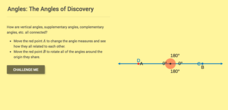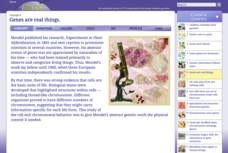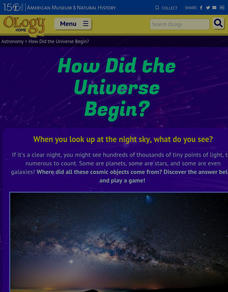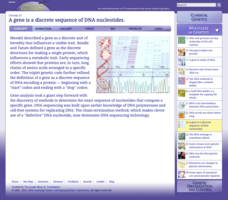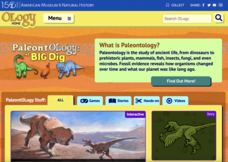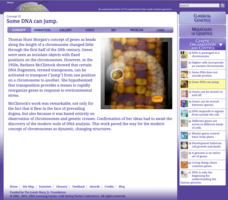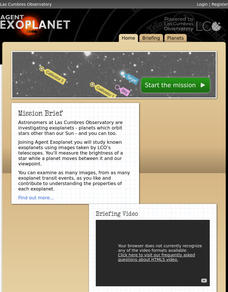CK-12 Foundation
Angles: The Angle of Discovery
Practice important angle vocabulary using an interactive lesson. As learners manipulate vertical angles, they watch the supplementary and congruent angles adjust. Questions pertaining to vocabulary and measurements follow their exploration.
CK-12 Foundation
Simplifying Rational Expressions: Sliding Solver
Build a strong understanding of simplified rational expression with your classes. An interactive lesson helps scholars discover the equality between the original expression and the simplified expression. Questions help individuals focus...
Howard Hughes Medical Institute
Structure and Function of Telomeres
Curing cancer or finding the fountain of youth—the answer may be understanding the structure and function of telomeres. The relationship of telomeres to both aging and cancer have triggered aggressive research. A thorough lesson...
Howard Hughes Medical Institute
RNA Interference
A classic experiment that stumped scientists for years grabs the attention of young scholars. A slideshow presentation explains the experimental discovery of RNA interface. The lesson goes on to explain in detail the function of RNA...
Howard Hughes Medical Institute
RNA Diversity
Messenger RNA, transfer RNA, and ribozymes ... the many faces of RNA. The structure of RNA makes it much more versatile than the very similar DNA. Learners view a slideshow presentation to learn all about the different forms and...
Cold Spring Harbor Laboratory
Genes Are Real Things
Proving microscopic structures exist is a difficult task. Learn how scientists did just that in the mid-1800s as they set out to identify the cellular structures related to genetics. The online lesson explains the collection of work that...
American Museum of Natural History
How Did the Universe Begin?
The Big Bang Theory is more than a television show. Pupils read how Edwin Hubble observed other galaxies and noticed that the galaxies are moving away from each other. Scholars learn about the idea of the big bang and what happened next...
Cold Spring Harbor Laboratory
A Gene Is a Discrete Sequence of DNA Nucleotides
Frederick Sanger won two Nobel prizes for protein sequencing and DNA sequencing. Young scientists learn about Dr. Sanger's research and amazing discoveries. They read an article and a biography, view videos and animations, and apply...
CK-12 Foundation
Multiplication of Rational Expressions
There's nothing irrational about this lesson. Explore the process of multiplying rational expressions through discovery. A well-designed lesson has learners factor and multiply rational expressions by dragging factors to the correct...
CK-12 Foundation
Inverse Variation Models: Speedometer for Inverse Variation Models
Model inverse variation while solving a real-world problem. Young scholars use the interactive lesson to discover the pattern of inverse variation data. They then use that discovery to write and analyze an equation.
CK-12 Foundation
Exponential Properties Involving Quotients
Watch as exponential expressions expand and contract! An interactive tutorial leads young mathematicians to the discovery of the quotient property of exponents. Through exploration, they realize that an x in the numerator will cancel an...
American Museum of Natural History
Anatomy Adventure
Sometimes science is puzzling. Using an online animation, individuals manipulate skeletal bones of an ancient species to recreate its skeleton. Learners complete the skeletal puzzle and learn about the process of paleontology in person...
PBS
Analyzing Light Curves of Transiting Exoplanets
Scientists detected exoplanets by measuring how the brightness of stars changed over time. Young astronomers interpret and analyze the same data that led to exoplanet discoveries. They learn to apply light curve graphs and connect the...
Cold Spring Harbor Laboratory
Some DNA Can Jump
Some people have a natural ability to jump, but did you know DNA also naturally jumps? Learn about the fun habit by looking at the research of a pioneering female scientist. Barbara McClintock fought prejudice and surpassed her mentors...
Khan Academy
Welcome to the Computer Science Platform
You don't need to know how to code in order to teach your students! Show them learning is a lifelong skill by learning along with them. Take this activity for example; the code is on the left, and the result is on the right. Can you...
Las Cumbres Observatory
Agent Exoplanet
Not everything revolves around the sun! Believe it or not, there are planets, called exoplanets, that orbit stars other than our sun. Learners use an interactive online resource to research several of these planets. They learn about the...
Howard Hughes Medical Institute
Visualizing Gene-Expression Patterns
How do genetics gurus know so much about gene expression? See traits materialize before your very eyes using a presentation with embedded simulations. Science scholars develop an understanding of the techniques used to follow the work of...
Judicial Learning Center
Getting Ready for Trial
A courtroom can be a scary place for the uninitiated. Get familiar with the process using a helpful overview of the activities that take place prior to both civil and criminal cases. The lesson explains the differences between...
Annenberg Foundation
Geometry 3D Shapes: Euler's Theorem
How do you get a theorem named after you? Euler knows what it takes! The third lesson of five asks pupils to use an interactive activity to compare the faces, vertices, and edges of seven different three-dimensional solids. They use...
Chemistry Collective
Virtual Lab: DNA Binding Problem
Why do the bases in DNA pair up the way they do? Unravel the mystery of the double helix in a virtual lab. Young scientists follow in the footsteps of Watson and Crick to determine the free energy associated with DNA base pair binding....
Shodor Education Foundation
Shodor Interactivate: Lesson: Pythagorean Theorem
Use triangles and worksheets to guide the learning of triangles to the discovery of the Pythagorean Theorem.
Harvard University
Harvard Smithsonian: Everyday Classroom Tools
The focus of this series of lessons is to engage students in an exploration of the world around them. The emphasis is on inquiry as students learn about the earth, sun, light, shapes and more.
